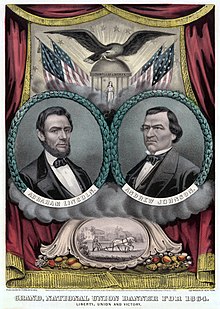
The 1996 United States presidential election was the 53rd quadrennial presidential election, held on Tuesday, November 5, 1996. Incumbent Democratic President Bill Clinton defeated former Senate Majority Leader Bob Dole, the Republican nominee, and Ross Perot, the Reform Party nominee and 1992 independent presidential candidate.
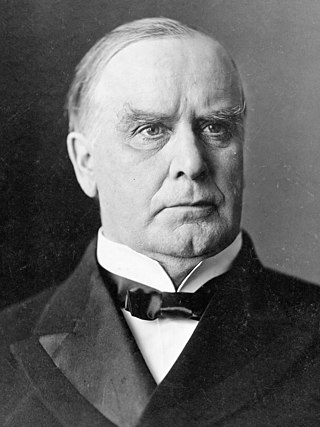
The 1900 United States presidential election was the 29th quadrennial presidential election, held on Tuesday, November 6, 1900. In a re-match of the 1896 race, incumbent Republican President William McKinley defeated his Democratic challenger, William Jennings Bryan. McKinley's victory made him the eighth president to win consecutive re-election and first since Ulysses S. Grant accomplished the same feat in 1872. Until 1956, this would be the last time in which an incumbent Republican president would win re-election after serving a full term in office. This election saw the fifth rematch in presidential history but the first to produce the same winner both times; neither would occur again until 1956.
A running mate is a person running together with another person on a joint ticket during an election. The term is most often used in reference to the person in the subordinate position but can also properly be used when referring to both candidates, such as by saying Joe Biden and Kamala Harris, and Uhuru Kenyatta and William Ruto, were running mates in relation to the presidential elections held in the United States in 2020 and Kenya in 2013 respectively.

The 1998 Minnesota gubernatorial election took place on November 3, 1998. Reform Party candidate Jesse Ventura defeated Republican Party challenger Norm Coleman and Minnesota Democratic–Farmer–Labor Party challenger Hubert H. "Skip" Humphrey III. Ventura governed with a DFL-controlled state Senate and a Republican-controlled state House. As of 2024, this is the only time that a Reform Party candidate has been elected to statewide office.

The 2006 New York gubernatorial election took place on November 7, 2006, to elect the governor and lieutenant governor of New York, concurrently with elections to the United States Senate in other states and elections to the United States House of Representatives and various state and local elections, then incumbent Republican governor George Pataki chose not to run for re-election in a fourth term. Democrat Eliot Spitzer, the New York Attorney General, won the election over former Republican state Assembly minority leader John Faso. As of 2024, this is the last time the Governor’s office in New York changed partisan control. This was the first open-seat election since 1982. Primary elections were held on September 12. This is the last gubernatorial election where any of the following counties voted Democratic: Genesee, Chautauqua, Cattaraugus, Niagara, Fulton, Steuben, Tioga & Schoharie.
In United States politics, balancing the ticket is a practice where a political candidate chooses a running mate, usually from the same party, with the goal of bringing more widespread appeal to the campaign. The term is most prominently used to describe the selection of the U.S. vice presidential nominee.
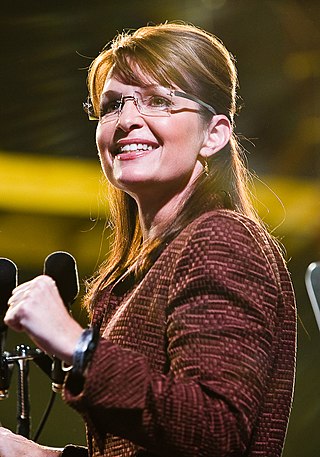
On March 4, 2008, Senator John McCain of Arizona won the 2008 nomination by the Republican Party for President of the United States, and became the presumptive nominee of the party. McCain held an event with Alaska governor Sarah Palin, revealing her as his vice presidential running mate on August 29, 2008, a date which coincided both with McCain's 72nd birthday and the Palins' 20th wedding anniversary), at the Ervin J. Nutter Center in Dayton, Ohio, the day after Barack Obama's acceptance speech. The McCain–Palin ticket ultimately lost to the Obama–Biden ticket in the 2008 presidential election.

The 2008 United States presidential election in Missouri was held on November 4, 2008, and was part of the 2008 United States presidential election, which took place throughout all 50 states and D.C. Voters chose 11 representatives, or electors to the Electoral College, who voted for president and vice president.

The 2008 United States presidential election in Wisconsin took place on November 4, 2008, as part of the 2008 United States presidential election in which all 50 states plus the District of Columbia participated. State voters chose 10 electors to represent them in the Electoral College via a popular vote pitting Democratic U.S. Senator from Illinois Barack Obama, and his running mate U.S. Senator from Delaware Joe Biden, against Republican challenger and U.S. Senator from Arizona John McCain and his running mate, Alaska Governor Sarah Palin.

The 2008 United States presidential election in North Dakota took place on November 4, 2008, and was part of the 2008 United States presidential election. Voters chose three representatives, or electors to the Electoral College, who voted for president and vice president.

The 2008 United States presidential election in Montana took place on November 4, 2008, and was part of the 2008 United States presidential election. Voters chose three representatives, or electors to the Electoral College, who voted for president and vice president.
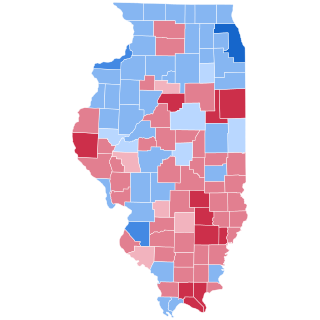
The 2008 United States presidential election in Illinois took place on November 4, 2008, and was part of the 2008 United States presidential election. Voters chose 21 representatives, or electors to the Electoral College, who voted for president and vice president.

The 2008 United States presidential election in Virginia took place on November 4, 2008, which was part of the 2008 United States presidential election. Voters chose 13 representatives, or electors to the Electoral College, who voted for president and vice president.
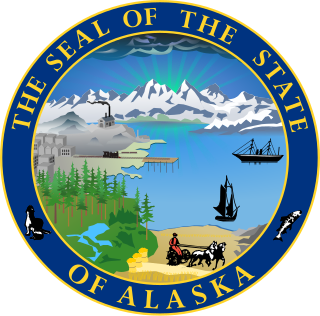
The 2008 United States presidential election in Alaska took place on November 4, 2008, as part of the nationwide presidential election held throughout all 50 states and the District of Columbia. Voters chose 3 electors, or representatives to the Electoral College, who voted for president and vice president.
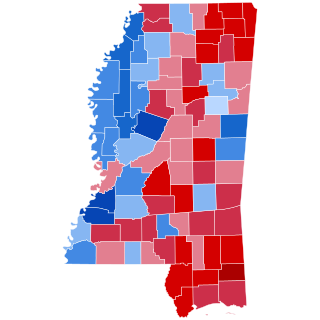
The 2008 United States presidential election in Mississippi took place on November 4, 2008, and was part of the 2008 United States presidential election. Voters chose 6 representatives, or electors to the Electoral College, who voted for president and vice president.

The 2010 Guam gubernatorial election was held on November 2, 2010. Incumbent Republican Governor Felix P. Camacho was term-limited and has ineligible for running for a third-consecutive term. In January 2009, the website D.C.'s Political Report predicted that the Republican Party would retain the governorship. Republican Eddie Calvo won the election.

The 1986 Illinois gubernatorial election was held on November 4, 1986. Republican candidate James R. Thompson won a fourth term in office, defeating the Illinois Solidarity Party nominee, former United States Senator Adlai Stevenson III, by around 400,000 votes.

The Social Democratic Party is a political party in Brazil led by Gilberto Kassab and uniting dissidents from various political parties, especially the Democrats, Brazilian Social Democracy Party and Party of National Mobilization.

United States gubernatorial elections were held on November 3, 2020, in 11 states and two territories. The previous gubernatorial elections for this group of states took place in 2016, except in New Hampshire and Vermont where governors only serve two-year terms. These two states elected their current governors in 2018. Nine state governors ran for reelection and all nine won, while Democrat Steve Bullock of Montana could not run again due to term limits and Republican Gary Herbert of Utah decided to retire at the end of his term.
